Enjoy the captivating cultural tapestry of Seoul as you embark on a journey through the city’s historic landmarks and lively marketplaces. From the regal splendor of Gyeongbokgung Palace to the vibrant culinary scene at Gwangjang Market, this tour promises to ignite your senses and uncover the essence of Korea’s time-honored traditions. Along the way, explore the National Folk Museum‘s treasure trove of artifacts and witness the charming juxtaposition of old and new in the captivating Bukchon Hanok Village. Prepare to be swept away by the perfect blend of architectural grandeur, culture, and gastronomic delight that awaits you.
This experience made our list of the 25 Best Shopping Tours In Seoul.
Key Points
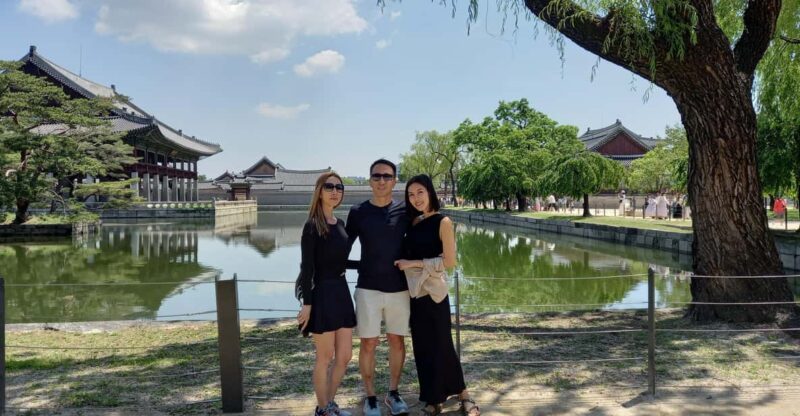
- The tour covers Gyeongbokgung Palace, National Folk Museum, Bukchon Hanok Village, and Gwangjang Market, providing a comprehensive cultural experience in Seoul.
- Gyeongbokgung Palace showcases the architectural and Confucian influences of the Joseon dynasty, while the National Folk Museum explores Korea’s cultural heritage.
- Bukchon Hanok Village offers a glimpse into the evolution of Korean culture, blending historic charm with modern elements.
- Gwangjang Market provides a sensory experience of traditional Korean street food, highlighting the country’s vibrant culinary traditions.
- The tour aims to enhance visitors’ understanding and appreciation of Korea’s rich cultural identity through its architecture, customs, and cuisine.
Tour Duration and Pricing
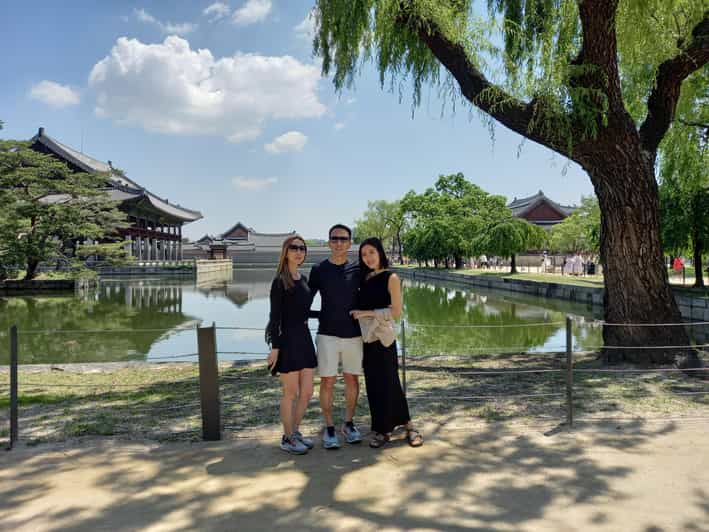
This 6-hour tour is priced from $186.96 per group of up to 3 participants, offering a compelling value proposition for those seeking an immersive exploration of Seoul’s cultural landmarks.
The tour includes a knowledgeable guide, admission fees, transportation, and even food and beverages, ensuring a seamless and carefree experience.
Whether travelers opt to start at the iconic Gwanghwamun Square or a customized meeting point, the flexibility provided allows them to tailor the journey to their preferences.
With free cancellation available up to 24 hours in advance, this tour presents an enticing opportunity to explore the rich heritage and vibrant essence of the city.
You can also read our reviews of more museum experiences in Seoul
Itinerary Highlights
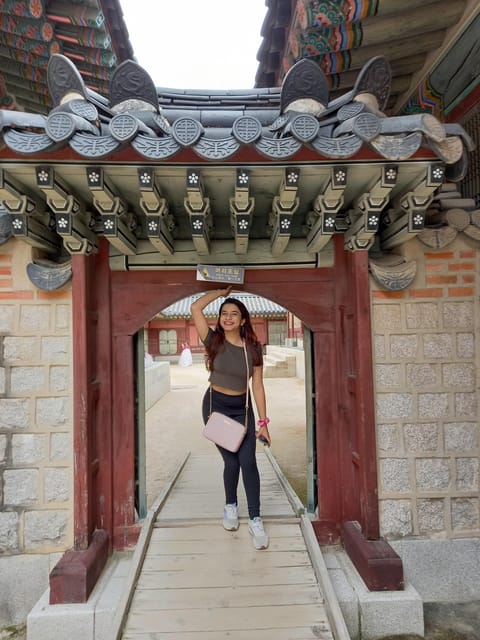
Visitors embark on a captivating journey through Seoul’s rich cultural tapestry, beginning at the majestic Gyeongbokgung Palace. The grand 2.5-hour guided tour transports them back to the Joseon Dynasty, where the palace’s traditional architecture and Confucian influences shine.
Next, they explore the National Folk Museum, uncovering the living customs and major ceremonies of the era. The vibrant Bukchon Hanok Village blends historic charm and modern flair, while the iconic Gwangjang Market tantalizes the senses with the aroma of sizzling Korean street food.
Each stop offers a unique glimpse into the heart of Korean culture, leaving guests with a deeper appreciation for the nation’s heritage.
Gyeongbokgung Palace
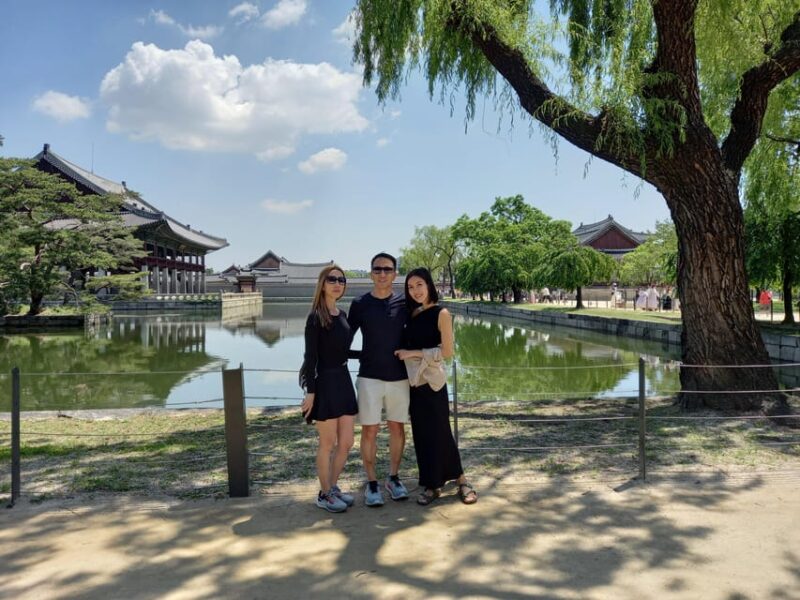
Anchoring the tour, Gyeongbokgung Palace stands as a magnificent testament to Korea’s Joseon heritage. Adorned with intricate architecture and ornate details, this 14th-century marvel transports visitors back in time.
Guests enjoy the palace’s rich history, learning about the influence of Confucianism that permeates its design. The guided tour offers a captivating exploration of the palace’s grand throne halls, ornate pavilions, and serene courtyards.
Witnessing the changing of the royal guard ceremony adds an extra dimension to the experience, showcasing the precision and discipline that defined the Joseon era. From the imposing main gate to the delicate beauty of the palace grounds, Gyeongbokgung offers a profound connection to Korea’s cultural legacy.
National Folk Museum
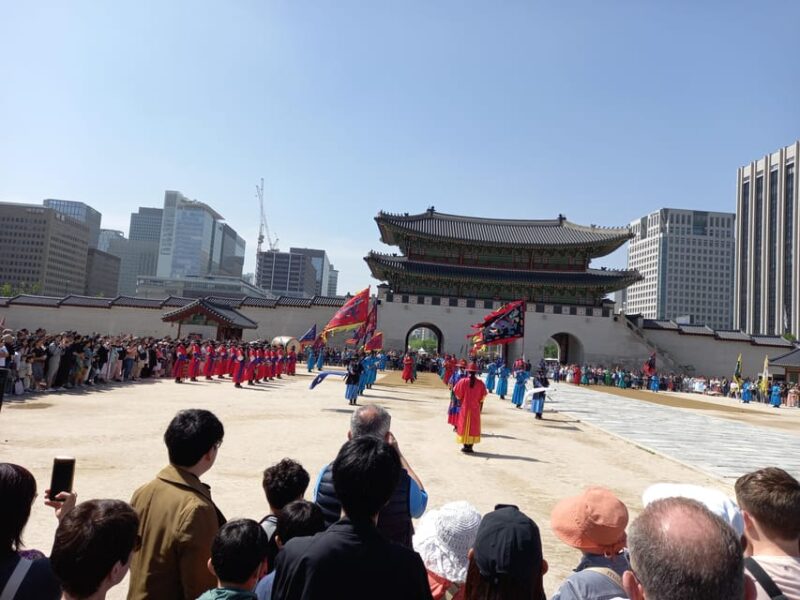
The National Folk Museum offers a captivating journey through Korea’s rich cultural heritage. Visitors are immersed in the living customs, traditions, and major ceremonies of the Joseon Dynasty.
The museum’s extensive collection showcases:
- Traditional Korean clothing and accessories
- Intricate handicrafts like pottery, metalwork, and woodcarving
- Historic musical instruments and performance arts
- Rituals and rites of passage, from weddings to funerals
- Everyday household items that provide a glimpse into everyday life
With its enlightening exhibits and immersive experiences, the National Folk Museum invites guests to discover the essence of Korean culture, leaving them with a deeper appreciation for the nation’s vibrant history and enduring traditions.
More Great Tours NearbyBukchon Hanok Village
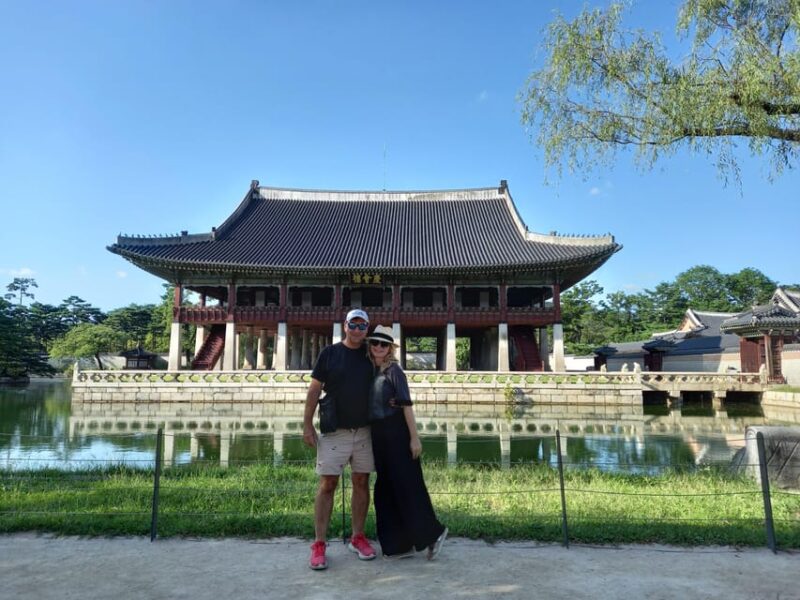
Nestled amidst the bustling streets of Seoul, Bukchon Hanok Village offers a captivating glimpse into Korea’s storied past. This picturesque neighborhood boasts around 1,000 traditional hanok houses, blending harmoniously with modern landscapes. Visitors can wander through the charming alleyways, admiring the intricate architectural details and harmonious hues that define this living museum.
| Architectural Highlights | Cultural Immersion | Immersive Experiences |
|---|---|---|
| Sweeping roofs, wooden beams, and vermilion pillars | Traditional tea ceremonies and calligraphy workshops | Dressing up in hanbok, the iconic Korean costume |
| Courtyard gardens and serene pathways | Exploring centuries-old craftsmanship and artisanal shops | Savoring local delicacies in cozy hanok-style cafes |
| Harmonious integration of historical and contemporary elements | Engaging with friendly residents and learning about their daily lives | Capturing the essence of old Seoul through photography |
You can also read our reviews of more shopping tours in Seoul
Gwangjang Market
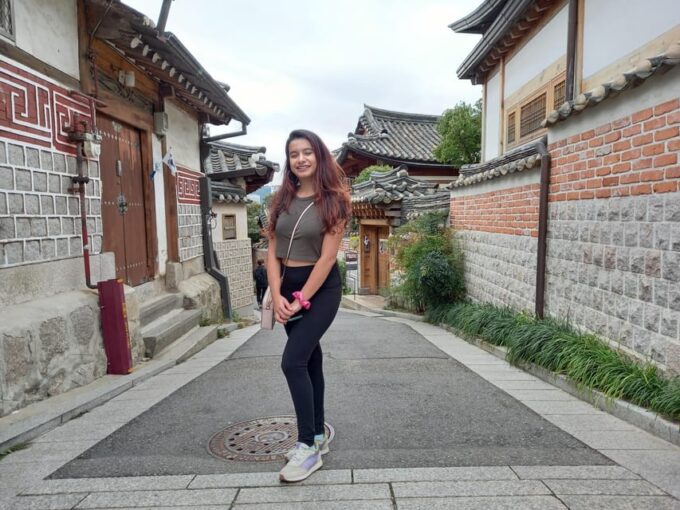
From the tranquil alleyways of Bukchon Hanok Village, the bustling energy of Gwangjang Market beckons.
This iconic food hall in the heart of Seoul delights the senses with its vibrant sights, sounds, and smells. Visitors wander through stalls featuring a mouthwatering array of traditional Korean delicacies:
- Fluffy, golden bindaetteok (mung bean pancakes)
- Steaming tteokbokki (spicy rice cakes)
- Chewy, savory japchae (sweet potato noodles)
- Sizzling godeungeo-gui (grilled mackerel)
- Freshly made kimbap (Korean seaweed rolls)
The guide leads the group through this epicurean wonderland, sharing insights into the cultural significance of these beloved street food specialties.
Cultural Significance
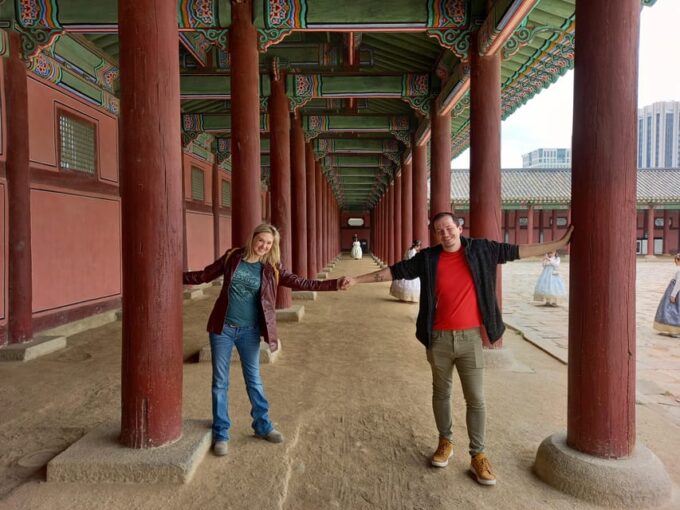
Gyeongbokgung Palace stands as the quintessential embodiment of traditional Korean architecture, a testament to the enduring influence of Confucianism that permeates the nation’s cultural fabric. This majestic structure, built in 1395, represents the very essence of the Joseon Dynasty, where Confucian principles shaped the socio-political landscape.
| Cultural Aspect | Significance |
|---|---|
| Architecture | Reflects the harmony between humans and nature, embodying the Confucian ideals of balance and order. |
| Confucianism | Shapes the Korean identity, emphasizing reverence for tradition, hierarchy, and social harmony. |
| Bukchon Hanok Village | Seamlessly merges historical and contemporary elements, showcasing the evolution of Korean culture. |
| Gwangjang Market | Represents the vibrant, dynamic spirit of Korean life, where traditional flavors and modern culinary trends coexist. |
Guest Experience
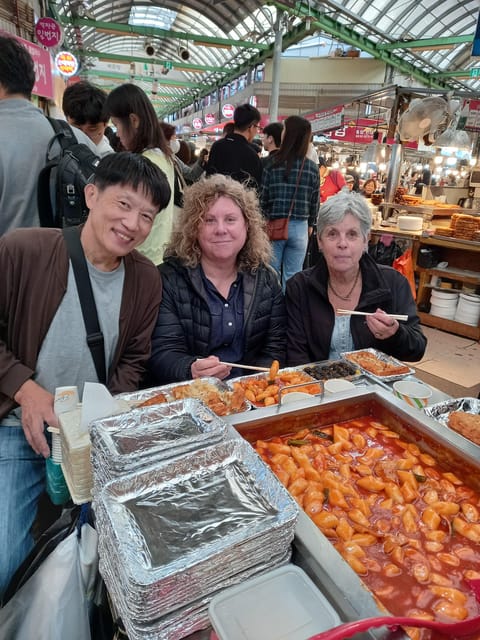
Embarking on this captivating cultural odyssey, guests are treated to an immersive experience that showcases the depth and richness of Korea’s heritage.
The tour guide’s deep knowledge and infectious enthusiasm bring the sites to life, offering insightful perspectives rooted in Confucianism.
Highlights include:
- Marveling at the intricate architecture of Gyeongbokgung Palace
- Savoring the tantalizing flavors of Korean street food at Gwangjang Market
- Immersing oneself in the living customs and traditions of the Joseon Dynasty at the National Folk Museum
- Strolling through the picturesque Bukchon Hanok Village, where old and new harmoniously coexist
- Leaving with a profound appreciation for the country’s cultural identity and its enduring influence.
Frequently Asked Questions
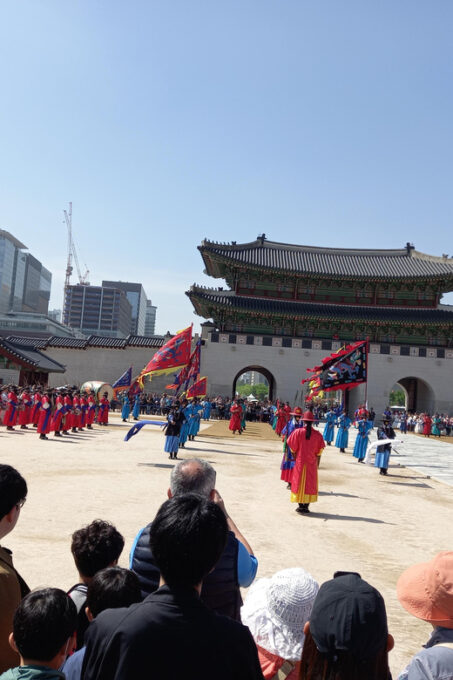
Can the Tour Be Customized for a Larger Group?
Yes, the tour can be customized for larger groups. The provider offers flexible meeting points and group pricing, allowing travelers to tailor the experience to their group’s needs and preferences.
Are Discounts Available for Students or Seniors?
Discounts for students and seniors are available, letting you explore Seoul’s cultural gems at a reduced rate. Dive into the dynamic flavors of the Gwangjang Market and learn about Korea’s timeless traditions.
Does the Tour Include Any Photography Stops?
The tour provides ample opportunities for stunning photographs throughout its sights, allowing guests to capture the essence of traditional Korean architecture, culture, and vibrant street life. Shutterbugs will delight in the photogenic backdrops encountered during the journey.
Are There Any Vegetarian/Halal Food Options at the Market?
The tour guide can easily point out the vegetarian and halal-friendly stalls at the Gwangjang Market, allowing guests to savor the vibrant flavors of Korean street cuisine without dietary restrictions. Scrumptious options abound for all palates.
Can the Tour Start or End at a Different Location?
Yes, the tour’s meeting point and end location can be customized after booking to suit your preferences. The knowledgeable guide will gladly accommodate your needs and ensure a seamless cultural exploration of Seoul.
Recap
Travelers enjoy Korea’s captivating heritage, from the grandeur of Gyeongbokgung to the vibrant hustle of Gwangjang Market. They uncover the nation’s rich culture, savoring traditional flavors and engaging in time-honored customs. This tour offers a holistic exploration, leaving visitors with a deeper appreciation for the enduring spirit of Korea.
You can check availability for your dates here:More Shopping Tours in Seoul
- Seoul: Guided Street Food Tour at Namdaemun Market
- Seoul Evening Tour:Gwangjang Market&Naksan Park&Eungbongsan
- Seoul City Tour: Gyeongbok Palace, N Tower & Local Market
- Seoul: K-Fashion Shopping Tour with a Professional Stylist
- Seoul: Mt Seorak(Cable Car)+Sokcho Beach&Market+Observatory
- Seoul: Fearless Foodie Gwangjang Market Food Adventure
More Museum Experiences in Seoul
- Seoul: DMZ Peace Trail, Barracks, Aegibong & War Museum Tour
- Seoul: War Memorial of Korea Guided Museum Tour
- Seoul: The War Museum, Jogyesa, and Tapgol Park Tour
- National Art Gallery Tour and Taste of Korean Cuisine in Seoul
- Outdoor Tour of the War Memorial Museum of Korea
- Gyeongbokgung-Folk Museum-Bukchon-Jogyesa Temple in Insadong
More Tour Reviews in Seoul
- Seoul: Bongeunsa Temple and Gourmet Night Tour in Gangnam
- Seoul Photoshoot by Fashion Photographer
- From Seoul: South Korea Demilitarized Zone Guided Tour
- Seoul: DMZ Tour with Exclusive North Korean Defector Meet-Up
- Seoul: Private Car Charter Tour with Professional Guide
- Seoul: Private chartered vehicle Carnival van City Tour
Not for you? Here's more nearby things to do in Seoul we have reviewed
- Seoul: Bongeunsa Temple and Gourmet Night Tour in Gangnam
- Seoul Photoshoot by Fashion Photographer
- From Seoul: South Korea Demilitarized Zone Guided Tour
- Seoul: DMZ Tour with Exclusive North Korean Defector Meet-Up
- Seoul: Private Car Charter Tour with Professional Guide
- Seoul: Private chartered vehicle Carnival van City Tour
- Bukhansan Mt. hiking & culture tour – 8 hours
- Seoul: Create Your Own Natural Perfume with a Perfumer
- Seoul: Private chartered vehicle Carnival van City Tour
- Seoul: chartered vehicle Toyota Sienna van City Tour
- Seoul : One day Customizable Private Driver Car Tour /JP
- Seoul: DMZ Peace Trail, Barracks, Aegibong & War Museum Tour
